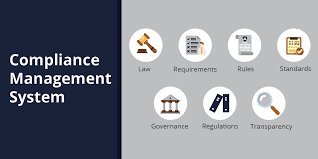The Importance of Compliance Tools in Today’s Business Environment
In today’s digital age, businesses are increasingly reliant on technology to streamline operations, enhance productivity, and drive growth. However, with this reliance on technology comes the need for stringent compliance measures to safeguard sensitive data and ensure regulatory adherence.
Compliance tools play a crucial role in helping organisations meet industry regulations, legal requirements, and internal policies. These tools are designed to monitor, assess, and enforce compliance standards across various aspects of a business’s operations.
Benefits of Compliance Tools
Implementing compliance tools offers numerous benefits to businesses:
- Enhanced Security: Compliance tools help identify vulnerabilities and security risks within an organisation’s systems and processes, allowing for timely remediation to prevent data breaches.
- Regulatory Adherence: By automating compliance monitoring and reporting, these tools assist businesses in meeting regulatory requirements without the need for manual intervention.
- Risk Mitigation: Compliance tools enable proactive risk management by identifying non-compliance issues early on and implementing corrective actions to minimise potential risks.
- Operational Efficiency: Streamlining compliance processes through automation improves operational efficiency, reduces human errors, and saves time and resources.
- Audit Readiness: With comprehensive reporting capabilities, compliance tools help businesses prepare for audits by providing detailed insights into their adherence to regulatory standards.
Choosing the Right Compliance Tools
When selecting compliance tools for your organisation, consider the following factors:
- Scalability: Ensure that the tool can accommodate your business’s growth and evolving compliance needs.
- User-Friendliness: Opt for tools that are intuitive and easy to use to encourage adoption across your organisation.
- Integration Capabilities: Look for tools that seamlessly integrate with your existing systems to maximise efficiency and data accuracy.
- Coverage: Choose tools that address a wide range of compliance requirements relevant to your industry or sector.
- Sustainability: Select tools from reputable providers with a track record of continuous support and updates to ensure long-term viability.
The Future of Compliance Tools
The landscape of compliance is constantly evolving with new regulations emerging and cybersecurity threats becoming more sophisticated. As such, the future of compliance tools lies in advanced technologies such as artificial intelligence (AI), machine learning, and predictive analytics. These technologies will enable real-time monitoring, predictive risk assessment, and automated responses to ensure proactive compliance management.
In conclusion, investing in robust compliance tools is essential for businesses looking to navigate the complex regulatory environment effectively. By leveraging these tools’ capabilities, organisations can enhance their security posture, streamline operations, and demonstrate a commitment to regulatory excellence in today’s competitive business landscape.
Contact us today at ComplianceSolutions.com to learn more about our cutting-edge compliance tools tailored to meet your business needs!
Understanding Compliance: Types, Tools, and Pillars Explored
- What are the three types of compliance?
- What is policy compliance tool?
- What are compliance tools?
- What are the 3 main pillars of compliance?
What are the three types of compliance?
In the realm of compliance tools, understanding the three primary types of compliance is essential for businesses aiming to uphold regulatory standards effectively. The first type, regulatory compliance, pertains to adhering to laws and regulations set forth by governing bodies relevant to a specific industry or region. The second type, internal compliance, focuses on aligning with a company’s internal policies, procedures, and standards to ensure consistency and operational integrity. Lastly, contractual compliance involves meeting the requirements stipulated in contracts or agreements with external parties. By recognising and addressing these distinct types of compliance through appropriate tools and strategies, organisations can bolster their governance frameworks and mitigate risks effectively.
What is policy compliance tool?
A policy compliance tool is a software solution designed to assess, monitor, and enforce adherence to predefined policies and regulations within an organisation. This tool helps businesses ensure that their operations align with internal policies, industry standards, and legal requirements. By automating the monitoring process, a policy compliance tool can identify violations, track remediation efforts, and generate comprehensive reports to demonstrate compliance status. Ultimately, the use of a policy compliance tool enhances security measures, promotes regulatory adherence, and streamlines the overall compliance management process for businesses across various industries.
What are compliance tools?
Compliance tools are essential software solutions designed to assist businesses in meeting regulatory requirements, industry standards, and internal policies. These tools play a vital role in monitoring, assessing, and enforcing compliance across various aspects of an organisation’s operations. By automating compliance processes, these tools help identify and address potential non-compliance issues proactively, thereby enhancing security, mitigating risks, and ensuring adherence to legal obligations. Compliance tools provide businesses with the necessary framework to streamline compliance management, improve operational efficiency, and maintain audit readiness.
What are the 3 main pillars of compliance?
Compliance in business is built upon three main pillars: regulatory compliance, operational compliance, and data security compliance. Regulatory compliance ensures that organisations adhere to laws and regulations relevant to their industry, protecting both the business and its stakeholders from legal risks. Operational compliance focuses on internal policies and procedures that govern how a company operates, promoting transparency and accountability within the organisation. Data security compliance is crucial for safeguarding sensitive information from breaches or unauthorised access, ensuring the confidentiality, integrity, and availability of data assets. Together, these three pillars form a solid foundation for effective compliance management in today’s complex business environment.

